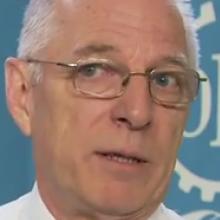
Steve Marshall, New Zealand’s new ambassador to Myanmar, said an agreement was finalised last week to fund a survey of social, economic and political priorities of residents in the remote and undeveloped western region of Myanmar.
It is also the home region of Henry Van Thio, who is second vice-president in Aung San Suu Kyi’s Government and previously lived in Dunedin for four years.

Speaking to the Otago Daily Times in Yangon, Mr Marshall said the research was one way New Zealand could help the fledgling democracy, which faces enormous challenges in its bid to once again become an important regional hub.
"We need to get to grips with the size of this transition," Mr Marshall said in what was one of his first interviews since the former head of the International Labour Organisation in Myanmar became New Zealand ambassador to the country in late June.
"This is not a simple transition. It is a massive transition, which is taking place on many different levels."
Mr Marshall said, after about 70 years of rule by different regimes, Myanmar, which still has shared civilian-army rule, had begun to make far-reaching changes.

They include instilling democratic concepts and behaviour, decentralising and opening the economy, negotiating peace between the Government and more than 20 warring factions and softening the top-down decision-making structure.
"Compared with when I arrived here in 2007, the country is 100% different to what it was. But I can also tell you that it is not yet normalised. And there is still a long way to go ... There is a huge amount of work to be done."
New Zealand supported democratic ideals and political change that benefited citizens as well as global relations and trade, he said.
"So New Zealand is keen to be supportive, as best it can, of these transitions."
The survey will canvass views of residents throughout the mountainous region.
The findings will provide the evidence base for development plans.
The work is being conducted by an independent, Myanmar-based, non-governmental organisation, the Centre of Diversity and National Harmony.
The research is expected to be completed by the end of March, next year.The funding being provided by New Zealand was "tiny", less than $NZ20,000, Mr Marshall said.
"That’s the thing about this country; you can do something that is very worthwhile for a very small amount of money.
"The potential for payback from that research into the community is very large."
Mr Marshall said he was aware of Mr Thio’s New Zealand connection.
The country wished him well in his new role, he said.
Despite the connection, the New Zealand government would have been looking to assist in Chin State anyway because of the level of need in the region.
"[It] is the poorest state in the country. It suffers seriously from a lack of infrastructure; access is very difficult. It is also prone to natural disasters," Mr Marshall said.
During the past 18 months, New Zealand has been involved in small aid projects in Chin State, such as small irrigation projects, supporting the replacement of water pipes following the magnitude 6.8 earthquake which struck Myanmar on August 24, and the provision of toilets in an area that had no sanitation.











